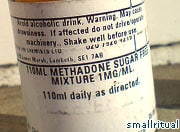The Scottish Government gave pharmacies £19 million to distribute methadone in 2012, according to latest figures revealed in the Daily Record.
Big chemist chains received the largest sums of money, including Boots, which got close to £4 million, and Lloyds Pharmacy, which received £3.6 million.
These figures come months after the Scottish Government agreed to review the controversial programme, which many argue does little to combat heroin addiction.
Concerning
Scottish Tory health spokesman Jackson Carlaw described the amount spent on the programme as “extremely concerning”.
Speaking about methadone, he said: “Instead of efforts being made to get people off drugs completely, too many are being parked on the drug for years.
“This is of no benefit to the individual and comes at a greater cost to the taxpayer.”
Negotiated
Community Pharmacy Scotland, which represents chemists across the country, said: “The fees that are paid are negotiated in each health board, who ask the chemists to dispense methadone.”
Methadone caused 237 deaths in 2012, making the drug a bigger killer than heroin.
Last year, Professor Neil McKeganey, director of the Centre for Drug Misuse Research, said: “Our main treatment now is the treatment that is associated with most deaths”.
“It’s an extraordinary situation and I cannot understand why our political leaders are not more exercised at the loss of life”, he added.
Benefit
Commenting in 2010 on cases such as that of a 34-year-old man who had received methadone for nearly 20 years, McKeganey argued that “serious questions” need to be asked about what “possible benefit” the methadone programme has.
Speaking of the money which chemists receive for methadone distribution, he said: “There’s considerable financial incentive that drug users remain drug dependent.”
A Times newspaper investigation previously concluded that addicts were pleading with the Government to help them get off drugs completely instead of leaving them on methadone.

